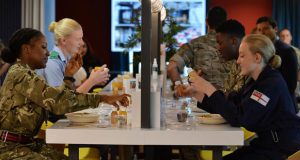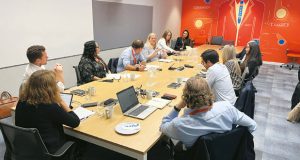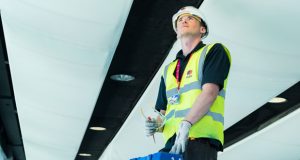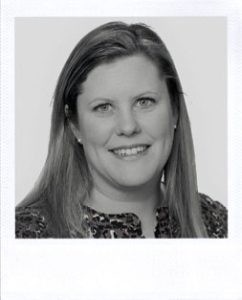 FORCES EMPLOYMENT CHARITY’S VIEW
FORCES EMPLOYMENT CHARITY’S VIEW
LUCY HEAVER,
SENIOR EXECUTIVE SERVICES MANAGER, FORCES EMPLOYMENT CHARITY
Here are some insights into how our organisation provides support to the military community and links them into different sector pathways in their careers on civvy street, in this case, FM.
We can work with you to raise the profile of your company amongst the Armed Forces community, promoting insight days, job opportunities, successful case studies, and creating networking opportunities, amongst many other things. We also provide support to companies around ways in which they can retain veteran talent through the development of internal Armed Forces networks and in doing so, recognising the potential that veterans can reach.
Facility managers are praised for their ability to adapt to inevitable adversity. They have the ability to push a facility forward efficiently yet able to assertively adapt plans when things go wrong. Veterans bring a huge wealth of experience and transferrable skills to the workplace when they leave the Armed Forces, they also bring significant value to the company that they join.
If you would like to understand more about the value that veterans can bring to your company we can come and talk to your internal hiring managers, HR and talent acquisition teams about ‘why military is good for business’ and how you can promote your vacancies with the Career Transition Partnership and those seeking middle to senior management roles.
The Forces Employment Charity exists to help all our clients achieve their full potential and in whatever field of work that may be. We provide life-long, life-changing support, jobs, networking and training opportunities to Service leavers, veterans, reservists and their families – regardless of circumstances, rank, length of service, or reason for leaving.
We also work in partnership with organisations and employers who, like us respect and value the unique qualities and abilities of all those who have served and their families.
Further information
To find out more about the support that we can offer you to attract and mobilise more veterans into the FM industry, please do get in touch with us at:
www.forcesemployment.org.uk
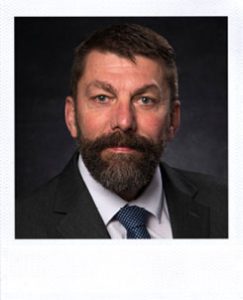 CHAIR OF CORPS VETERANS ASSOCIATION’S VIEW
CHAIR OF CORPS VETERANS ASSOCIATION’S VIEW
NIGEL HORNE,
DIVISIONAL DIRECTOR, CORPS SECURITY
Undoubtedly, veterans’ skills, training, commitment, and work ethic lend themselves to roles within the FM sector, particularly for security services. Corps Security has always been a staunch supporter of veterans and launched the Corps Veterans Association to unite the veteran community with employment and career advancement on our agenda.
The issue veterans face across the FM sector, including security, is that the pyramid is quite steep for them to climb to get into the roles they would typically desire. There is a level of expectation from the individual leaving the forces that they have these skills and, therefore, expect to enter a role within the sector at a management level. However, the training and experiences of many veterans in the armed forces would not naturally provide the skills of a project manager, for example.
In the case of security, more specifically, a veteran will have some incredibly transferable skills. However, they can expect to do the same Security Industry Authority courses to obtain their license and upskill when required, too. Essentially, they will have to begin their new career at the bottom rung of the ladder, and for many, this can be hard to swallow, having been in such an influential career for possibly many years.
In my opinion, and something we have opened discussions around at Corps Security, is that we must work as a sector (both FM and security) to create a veteran’s fast-track training and development programme to mitigate the concerns of these individuals. Of course, they will need to begin at the lower end of the pyramid; however, we can provide a defined training and development solution with a structured, defined timeline to get them to the role they desire. Such a solution will work for all areas of FM, make the sector more attractive to veterans for all of us to take advantage of their work skills and ethics, and, in the long term, fill the skills gaps that the sector continues to experience over recent years.
There are other considerations when developing such a programme. Many veterans will have families, live in forces’ accommodation, and therefore need relocation support. It may be necessary to work alongside organisations such as the Forces Employment Charity to consider relocation packages – which could be a significant investment for our businesses. Still, if the package is desirable in the long term, it would have a positive cost-benefit outcome. Much will need to be considered, discussed, and investigated to ensure that everything in place is desirable for both the employer and the veteran.
Corps would be delighted to work with other organisations to develop a steering group to define the parameters, collaborate to bring leaders together and create an attractive programme suitable for the wider industry. Such a group would also have more comprehensive support from the Corps Veterans Association community, too.


